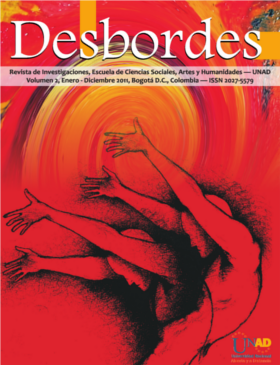Copyright (c) 2015 Desbordes

This work is licensed under a Creative Commons Attribution-NonCommercial-ShareAlike 4.0 International License.
La revista Desbordes se reserva el derecho de reproducción total o parcial del material en medio físico o digital, así como su inclusión en bases de datos, hemerotecas y demás procesos de indexación (SIRes).
La aceptación o rechazo de artículos postulados dependerá del concepto final emitido por los pares evaluadores y el aval de los comités editorial y científico.
Las ideas y conceptos expresados son responsabilidad de los autores y, en ningún caso reflejan las políticas de la UNAD




